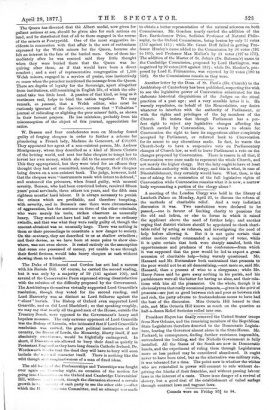A meeting of the London Clergy was held in the
library of Lambeth Palace on Monday, April 23, to discuss the reform of the methods of charitable relief. And a very indistinct discussion it was. Two resolutions were declared to be peased,—one in favour of limiting charity to pensions for the old and infirm, or else to forms in which it raised the applicant above the need of further help-; and another urging that district visitors should be appointed to cheek chari- table relief by acting as referees, and investigating the need, of help before allowing it. But it is not quite certain that either motion really commanded a majority, of votes, while it is quite certain that both were sharply aseailed, both the opportuneness and prudence of the conference,—from which it was supposed that the poor would be led to expect a great accession of charitable help—being warmly questioned. Mr. Hansard and Mr. Buttanshaw both maintained that presents to the poor would not be at all demoralising,—not more .so, said Mr. Hansard, than a present of wine to a clergyman; while Mr. Harry Jones said he gave away nothing in his pariah, and his parishioners were all the better for having no alms, and their rela- tions with him all the pleasanter. On the whole, though it is obviouslytrue that really occasionalpresenta—given in the spirit of presents—are just as good between rich and poor as between rich and rich, the party adverse to freehandednees seems to have had the best of the discussion. Miss °devil Hill leaned to that side, and Miss Octavia Hill knows as much on the question as half-a-dozen Relief Societies rolled into one.


































 Previous page
Previous page